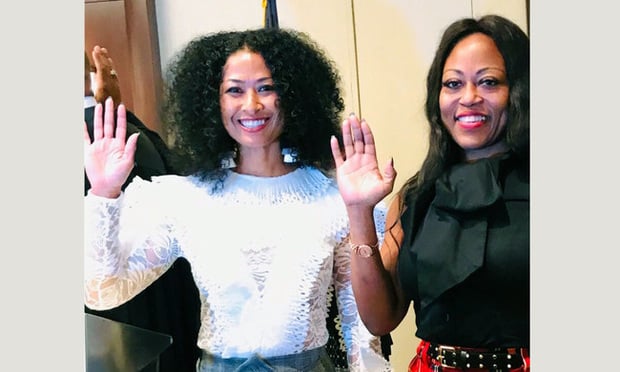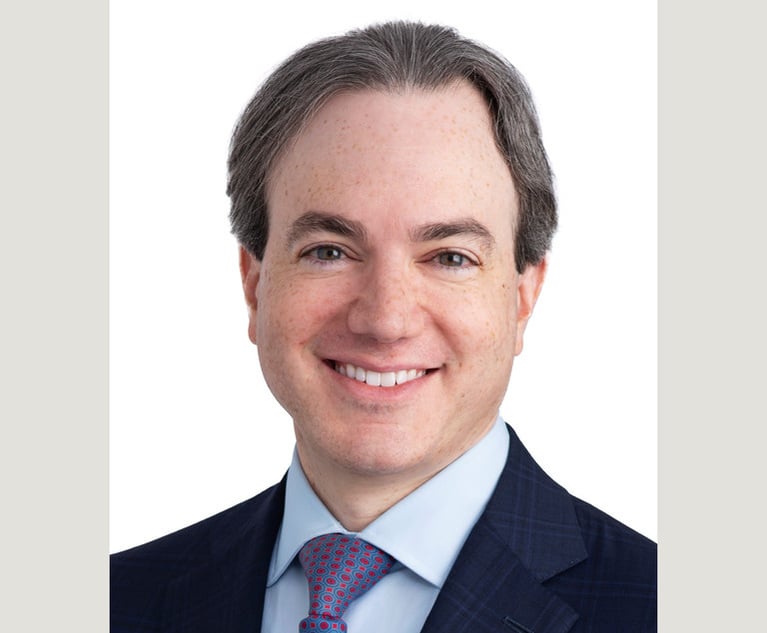Two Dallas Judges Warned for Endorsing Each Other's Candidacy in Election Slate
The State Commission on Judicial Conduct has disciplined two Dallas district court judges who ran on a political slate together last year and endorsed each other's candidacy.
January 04, 2019 at 01:53 PM
4 minute read
 Judge Kim Cook, left, and judge Andrea Martin, right. Courtesy photo
Judge Kim Cook, left, and judge Andrea Martin, right. Courtesy photo
The Texas Code of Judicial Conduct prohibits state judges from endorsing political candidates. And that's why the State Commission on Judicial Conduct has disciplined two Dallas district court judges who ran on a political slate together last year and endorsed each other's candidacy.
The commission issued two public warnings to both Kim Cooks, judge of the 255th District Court, which handles family law, and Andrea Martin, judge of the 304th District Court, which handles juvenile law.
According to their warnings, during their 2018 campaigns for re-election, Cooks and Martin produced and distributed a campaign mailer that featured their names, titles and likenesses, urging voters to vote for each of them for their respective judicial races. The mailer included statements such as “Keep this talented team working for our families and for our children.”
Cooks and Martin also produced two campaign videos and posted them on social media in which they ask voters to support both of them in their reelection efforts. In one of the videos, the judges state: “We are your Dallas County Judges, your people's judges. We are the community judges. And we need your help.”
Cooks and Martin also told the commission that they jointly hosted a fundraising event, at which separate tables were set up for each campaign. They also stated that their individual campaigns shared equally in the costs associated with the mailer, the videos and the fundraising event.
The commission concluded that both Cooks and Martin violated Canon 2B of the judicial conduct code, which prohibits a judge from lending “the prestige of judicial office to advance the private interests of the judge or others” and Canon 5(2) which prohibits a judge from “the public use of his or her name endorsing another candidate for any public office, except that either may indicate support for a political party.”
“The commission concludes from the facts and evidence presented that by engaging in joint campaign efforts with Judge Martin, including holding a joint fundraiser, and producing and disseminating campaign materials featuring both judges suggesting they were running as a team, Judge Cooks lent the prestige of her judicial office to advance the private interests of Judge Martin, in violation of Canon 2B,” according to the warnings.
“Moreover, by authorizing the use of her name, title, and likeness on advertisements supporting Judge Martin's campaign as well as her own, Judge Cook's conduct constituted a public endorsement of Judge Cooks expressly prohibited by Canon 5(2),” according to the warning.
Martin's separate warning contained nearly identical language. Both Cook and Martin were ordered to obtain two hours of instruction with a mentor and additional education in the area of campaigning.
Cooks and Martin both said they do not plan to appeal the warning and that they learned something from their interactions with the commission.
“We are thankful for the judicial conduct commission because they gave us excellent guidance,” Cooks said. “Now we know. You know better you do better.''
Martin said that both she and Cooks are close friends and that it just made sense to them to campaign together — they just didn't realize they were running afoul of the judicial canons.
“We told them when we went to new judges school, they didn't teach us about campaigns. We thought we were following the rules and the commission was helpful,'' Martin said. “The way we're looking at it, it's an opportunity to learn more about what we didn't learn about campaigns. We're friends, we work out together, that's not going to change.”
The commission has also suspended South Texas judge Rodolfo “Rudy” Delgado for a second time. Delgado, a former judge of the 93rd District Court in Edinburg, was suspended by the commission last year after he was indicted in a federal court for allegedly accepting bribes from a lawyer who was working as a confidential informant for the FBI.
Days after his March 2018 indictment, Delgado won the Democratic primary election for a seat on Corpus Christi's 13th Court of Appeals. Delgado resigned his trial court bench and later won the November general election for the seat.
Because of Delgado's election to another judicial office, the commission again reviewed the facts and circumstances related to his indictment and again voted to suspend him without pay.
Delgado, who has plead not guilty to the federal charges, did not return a call for comment.
This content has been archived. It is available through our partners, LexisNexis® and Bloomberg Law.
To view this content, please continue to their sites.
Not a Lexis Subscriber?
Subscribe Now
Not a Bloomberg Law Subscriber?
Subscribe Now
NOT FOR REPRINT
© 2025 ALM Global, LLC, All Rights Reserved. Request academic re-use from www.copyright.com. All other uses, submit a request to [email protected]. For more information visit Asset & Logo Licensing.
You Might Like
View All
Houston-Based Law Firm Overcomes Defamation Suit for Website Warning
3 minute read

Houston Law Firm Files $250K Breach of Contract Suit Against 2 Former Lawyers
3 minute read
‘What’s Different About Jarkesy?’ 5th Circuit Weighs if FCC Forfeiture Order Is Constitutional
Trending Stories
- 1Latham's Lateral Hiring Picks Up Steam, With Firm Adding Simpson Practice Head, Private Equity GC
- 2Legal Restrictions Governing Artificial Intelligence in the Workplace
- 3Failure to Adequately Inform Patients
- 4'FTX' One Year Later: The Impact on Examiner Practice in Bankruptcy Courts
- 5Gen AI Legal Contract Startup Ivo Announces $16 Million Series A Funding Round
Who Got The Work
J. Brugh Lower of Gibbons has entered an appearance for industrial equipment supplier Devco Corporation in a pending trademark infringement lawsuit. The suit, accusing the defendant of selling knock-off Graco products, was filed Dec. 18 in New Jersey District Court by Rivkin Radler on behalf of Graco Inc. and Graco Minnesota. The case, assigned to U.S. District Judge Zahid N. Quraishi, is 3:24-cv-11294, Graco Inc. et al v. Devco Corporation.
Who Got The Work
Rebecca Maller-Stein and Kent A. Yalowitz of Arnold & Porter Kaye Scholer have entered their appearances for Hanaco Venture Capital and its executives, Lior Prosor and David Frankel, in a pending securities lawsuit. The action, filed on Dec. 24 in New York Southern District Court by Zell, Aron & Co. on behalf of Goldeneye Advisors, accuses the defendants of negligently and fraudulently managing the plaintiff's $1 million investment. The case, assigned to U.S. District Judge Vernon S. Broderick, is 1:24-cv-09918, Goldeneye Advisors, LLC v. Hanaco Venture Capital, Ltd. et al.
Who Got The Work
Attorneys from A&O Shearman has stepped in as defense counsel for Toronto-Dominion Bank and other defendants in a pending securities class action. The suit, filed Dec. 11 in New York Southern District Court by Bleichmar Fonti & Auld, accuses the defendants of concealing the bank's 'pervasive' deficiencies in regards to its compliance with the Bank Secrecy Act and the quality of its anti-money laundering controls. The case, assigned to U.S. District Judge Arun Subramanian, is 1:24-cv-09445, Gonzalez v. The Toronto-Dominion Bank et al.
Who Got The Work
Crown Castle International, a Pennsylvania company providing shared communications infrastructure, has turned to Luke D. Wolf of Gordon Rees Scully Mansukhani to fend off a pending breach-of-contract lawsuit. The court action, filed Nov. 25 in Michigan Eastern District Court by Hooper Hathaway PC on behalf of The Town Residences LLC, accuses Crown Castle of failing to transfer approximately $30,000 in utility payments from T-Mobile in breach of a roof-top lease and assignment agreement. The case, assigned to U.S. District Judge Susan K. Declercq, is 2:24-cv-13131, The Town Residences LLC v. T-Mobile US, Inc. et al.
Who Got The Work
Wilfred P. Coronato and Daniel M. Schwartz of McCarter & English have stepped in as defense counsel to Electrolux Home Products Inc. in a pending product liability lawsuit. The court action, filed Nov. 26 in New York Eastern District Court by Poulos Lopiccolo PC and Nagel Rice LLP on behalf of David Stern, alleges that the defendant's refrigerators’ drawers and shelving repeatedly break and fall apart within months after purchase. The case, assigned to U.S. District Judge Joan M. Azrack, is 2:24-cv-08204, Stern v. Electrolux Home Products, Inc.
Featured Firms
Law Offices of Gary Martin Hays & Associates, P.C.
(470) 294-1674
Law Offices of Mark E. Salomone
(857) 444-6468
Smith & Hassler
(713) 739-1250






